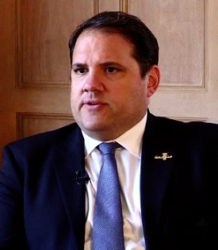MEXICO CITY, (Reuters) – Canadian businessman Victor Montagliani was elected president of CONCACAF, the embattled governing body for soccer in North, Central America and the Caribbean, yesterday.
Montagliani, head of his country’s football association, won by 25 votes to 16 after vowing to make the organisation more corporate. His opponent, Bermuda’s Larry Mussenden, had promised to help the confederation’s smaller nations.
“Football is a business and as president you must be able to work the corners of the global corporate community,” the eventual winner said in a 10-minute speech to CONCACAF’s 41 members before the vote.

“I understand the desire for change we so desperately need. I am a football man, a CONCACAF man, and very proud of it.”
Montagliani has already said that the United States will continue to host the CONCACAF Gold Cup, which is held every two years, for the foreseeable future and that he wants to increase the number of participants from 12 to 16.
However, he suggested that other countries could host “segments” of each tournament.
Mussenden, a lawyer who is Bermuda’s director of public prosecutions, drew applause from the delegates when he promised there would be no splurging on expensive consultancy firms.
“We must say goodbye to eight million dollar-a-year consultants and put those funds into development,” he said.
The two men, head of the Football Associations of their respective countries, were bidding to lead CONCACAF out of years of turmoil.
The Miami-based confederation has been at the centre of a corruption scandal that has engulfed world football, during which 42 individuals and entities have been charged in the United States on a variety of graft-related offences.
Three of CONCACAF’s most recent presidents, Trinidad and Tobago’s Jack Warner, Cayman Islander Jeffrey Webb and Honduran Alfredo Hawit, are among those charged.
CONCACAF lawyer Samir Gandhi said that the Confederation continued to be considered as a victim by U.S. prosecutors, but had to implement reforms approved in February.
“This is an organisation that’s no longer in crisis,” he said. “It is important we continue to maintain our status as a victim. We have to implement these reforms and that is the key to maintaining our status as a victim.”





